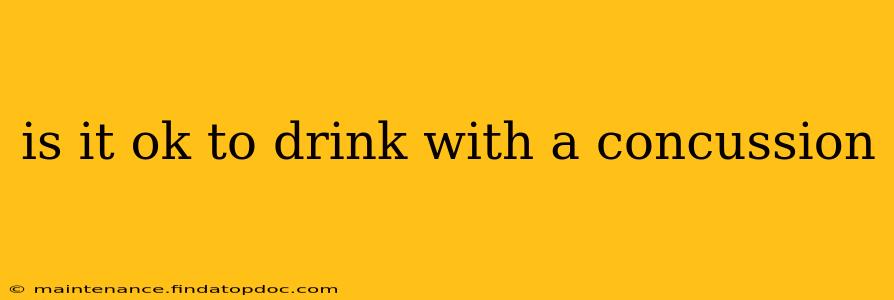Is It Okay to Drink Alcohol With a Concussion? Absolutely Not.
A concussion is a traumatic brain injury (TBI) that can disrupt brain function. While the symptoms can vary widely from person to person, ranging from mild to severe, one thing remains consistent: alcohol is absolutely contraindicated. Drinking alcohol after a concussion can significantly worsen your symptoms and prolong your recovery time. This is not a matter of opinion; it's a medically supported fact.
Here's why you should avoid alcohol at all costs after a concussion:
Alcohol's Impact on Brain Recovery:
Alcohol is a central nervous system depressant. This means it slows down brain activity. After a concussion, your brain is already struggling to function optimally; it's trying to heal and repair itself. Introducing alcohol adds another layer of stress, hindering this crucial process.
The effects of alcohol can:
- Exacerbate symptoms: Headaches, dizziness, nausea, vomiting, and confusion are common concussion symptoms. Alcohol can intensify these, making them more frequent and severe.
- Slow healing: Alcohol interferes with the body's natural healing processes, delaying brain recovery and increasing the risk of long-term complications.
- Increase the risk of complications: In severe cases, alcohol consumption after a concussion can increase the risk of secondary brain injuries, including increased intracranial pressure and bleeding.
- Mask symptoms: Alcohol can temporarily mask some concussion symptoms, leading to a false sense of improvement and potentially delaying necessary medical attention. This can lead to missed diagnoses and treatment delays.
What are the Long-Term Effects of Drinking Alcohol After a Concussion?
While the short-term effects are significant, the potential long-term consequences are even more concerning. Alcohol's interference with brain repair could contribute to:
- Prolonged recovery: It can significantly lengthen the time it takes to fully recover from a concussion.
- Post-concussion syndrome (PCS): PCS encompasses a range of persistent symptoms that can last for weeks, months, or even years after the initial injury. Alcohol consumption may increase the risk of developing or worsening PCS.
- Cognitive impairment: Alcohol can further impair cognitive function, affecting memory, concentration, and processing speed, already potentially compromised by the concussion.
What Should You Do Instead of Drinking?
Focus on rest, hydration, and proper nutrition. These are crucial elements of concussion recovery. Avoid strenuous activities and get plenty of sleep. Stay hydrated by drinking plenty of water. Consume a balanced diet rich in fruits, vegetables, and whole grains.
What If I've Already Had Alcohol After My Concussion?
If you've already consumed alcohol after a concussion, contact your doctor or healthcare provider immediately. They can assess your condition and advise you on the appropriate course of action. Don't hesitate to seek medical attention; it's better to be safe than sorry.
Can I Drink Alcohol After a Concussion Has Fully Healed?
Even after a complete recovery from a concussion, it's wise to discuss alcohol consumption with your doctor. The brain's vulnerability after a concussion can linger, and your doctor can provide personalized guidance based on your specific situation and medical history.
In conclusion, abstaining from alcohol after a concussion is paramount for optimal recovery and to minimize the risk of long-term complications. Your brain's health is crucial; prioritize your recovery and consult a medical professional for any concerns.
